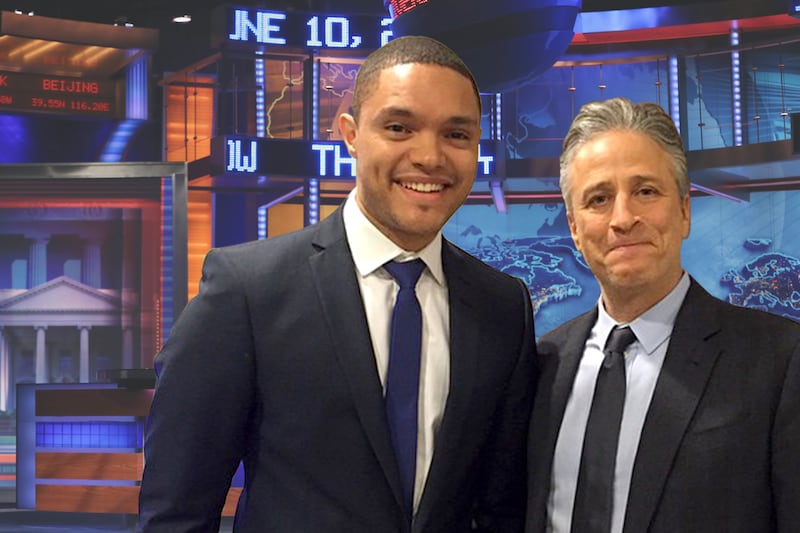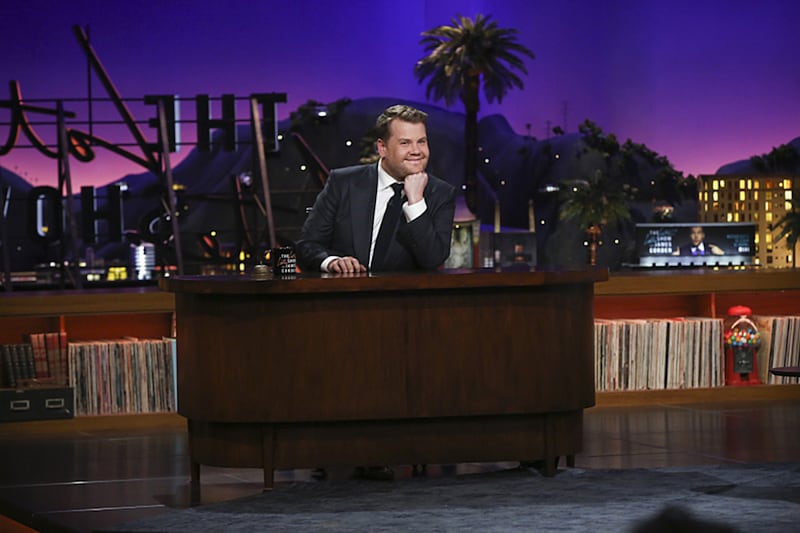In the wake of Monday’s media controversy over a Vanity Fair piece titled “Why Late-Night Television Is Better Than Ever” and its accompanying photo that does not include a single female performer, we thought now would be the perfect occasion to revisit our own piece about the phenomenon.
There are happy thoughts galore to be had about Trevor Noah, a fresh-faced, biracial rising comedy star joining and disrupting the ranks of white men in suits as late-night TV’s newest hire: the future replacement for Jon Stewart as host of The Daily Show. But drowning out those thoughts is one deafening, rage-inducing, society-shaming one: Is there really not a single goddamned woman in Hollywood they could have hired for this job?
With an unprecedented wave of turnover on nearly every single late-night talk show, the onus has fallen more severely on each successive one to hire a woman, with our culture becoming increasingly infuriated at the male-dominated genre. That’s why amidst the cheers for Comedy Central for hiring a biracial comedian to take over The Daily Show, there’s a competing and perhaps louder groan.
Each time a woman is passed over, the disappointment cuts deeper. The outrage is louder.
At an age when representation, visibility, and access in entertainment have become not just a goal, but a veritable cultural mandate, it’s starting to seem to those people that there may never be a woman in a prominent position in late-night. And they may be right.
In the announcement of Noah’s hiring, Comedy Central president Michele Ganeless told The New York Times, “You don’t hope to find the next Jon Stewart—there is no next Jon Stewart. So, our goal was to find someone who brings something really exciting and new and different.”
Trevor Noah certainly accomplishes that in a soft enough manner to not totally demolish a format so winning and seemingly foolproof that it’s been replicated ad nauseum since Stewart’s debut, but instead give it a slight renovation, in the way that Last Week Tonight With John Oliver and The Nightly Show With Larry Wilmore have done recently. But the format has long needed a woman’s touch.
Now, to the credit of Ganeless, she was asked the burning question alluded to at the top of this piece. “Seriously? Again? Not a woman?” Her answer to the Times: “We talked to women. We talked to men. We found in Trevor the best person for the job.”
That’s comforting, and perhaps refreshing to hear. After all, the chorus of culture critics crying for a female late-night host isn’t begging for tokenism, or a female hire for the sake of a female hire. The demand stems from the passionate belief that there are qualified female comedians and hosting talent out there who deserve their places behind these patriarchal desks.
But that “best person for the job” nonsense is also complete horseshit, and the greatest indicator of the institutional barriers, the institutional laziness, and the institutional cowardice that are forecasting the inevitability that no woman will ever again hold a major position in late-night. And if she does, she’s not going to end up there the easy way.

There’s just no merit to the idea that, with nearly every single legacy late-night show on broadcast and cable hiring a new host in the last two years, not a single woman was the “best person” for any one of the jobs that ended up going to Jimmy Fallon, Seth Meyers, Stephen Colbert, James Corden, Larry Wilmore, and, now, Trevor Noah.
It’s smart of Comedy Central to name a relative unknown as the successor to the ubiquitous name it essentially built its network’s entire brand around. It thwarts the burden of expectations. But that the network, which has reinvented itself in recent years making stars of relative unknown female talents like Amy Schumer and the Broad City girls, didn’t think it would be even smarter to hire a woman is unduly depressing.
People have wondered whether Tina Fey or Amy Poehler were approached for the gig—which is ridiculous and insulting to them, as they are far too famous and successful to have ever taken it. But Comedy Central has long been in the business of creating comedy stars. This is a missed opportunity to make a groundbreaking one.
It’s proof that history keeps repeating itself. And the history of women in late-night is a simple, sad one.
In 1986, Joan Rivers became the first woman to host a late-night TV show on a broadcast network. Her show didn’t even last a year. Instead of becoming TV’s first female in late-night success story, she became its cautionary tale. In the years since, only one woman would find longevity in late-night, Chelsea Handler, but for her all of her success would always be ghettoized as a gossip monger on E!—a designation she openly hated and complained about.
Joan Rivers, then, was the strangest of trailblazers: the kind where no one actually follows her trail.
There’s a bit of Culture of Disgruntlement harrumphing going on here. No, we will never be happy. Give us two black men in late-night—a milestone we’ve long been clamoring for—and we’ll still say it’s not enough. We’ll still complain that there are no women. Are we being greedy? Maybe. Maybe we’re being bratty, too. But we’re still going to pout. We’re going to play with that puppy you got us for Christmas, but whine that it wasn’t the puppy that we specifically put on our wish list. We want a woman in late-night.
Specifically, we wanted a woman hosting The Daily Show.
Not even days had passed after Stewart announced he was leaving the show that a grassroots campaign erupted demanding that Jessica Williams—another fairly new talent for the show—be hired as his replacement. She politely declined the role she was never offered, tweeting, “Thank you but I am extremely under-qualified for the job!” (How silly does her “under-qualified” statement look now that Noah, who joined The Daily Show over a year after Williams, got the job?)
Williams’s insinuation that she didn’t deserve the job pissed people off in the first place. Think pieces were written about how Williams should’ve “leaned in” and taken the position that people were saying was rightfully hers. She fired back at those people, asserting that they were denying her of her own agency.
There was unfortunate misogyny and patronizing at the underbelly of the attacks against Williams for not “leaning in.” But the root of that might be the fact that any instance of a woman hosting a late-night show since Joan Rivers has occurred because that woman has had to front her own, brand-new show.
Chelsea Handler was a success, sure. But she wasn’t wheeled in an office chair behind an existing desk and then given the platform, ratings, existing creative structure, and prestige of the audience that was already sitting there, waiting for her to arrive (a luxury that was afforded Fallon, Meyers, Colbert, Corden, and Noah, as they took over already iconic shows).
In recent years, Kathy Griffin, Whitney Cummings, and Wanda Sykes have all attempted to replicate a variance of what Chelsea Handler did with Chelsea Lately, fronting their own brand-new shows in late-night and all failing miserably. It’s hard to launch a talk show. There are high expectations and swift judgments and, most of all, a dwindling audience to woo. That last thing, especially, is a massive hurdle to clear.
The truth of the matter is that no one watches late-night anymore. Or, at least, no one watches late-night in late-night. The genre has become a playground for viral videos and inventive sketches that live on past the late hours these shows air. Guys like Fallon, Kimmel, and, recently, Corden, are given a license to play because their playgrounds have what could be considered historical landmark status. Tonight, Late Night, The Late Show, The Late Late Show, The Daily Show…these are cornerstones of late-night television that are not going away any time soon, ratings be damned.
But just getting permits to build a new playground is near impossible. And staying open for business once you’ve gotten them is even harder. That’s why we’re so pissed when women keep getting passed over for these big positions. Even if they’re proactive enough to break the mold, they’re essentially being set up for failure.

(Case in point for how hard it is to attract prolonged interest in a non-legacy late-night endeavor: Conan O’Brien. Remember how excited we were for him to get his own TBS show freed from the shackles of hallowed network institutions? And remember how quickly Team Coco bailed on him and returned to those network playgrounds once the shine of the new show wore off?)
Which is why we need to go back to this “best person for the job” thing.
When Chelsea Handler announced she was leaving E!, her departure coincided with David Letterman announcing his exit from The Late Show. It was the common opinion—both in the industry and out—that she was the “best person” to replace Letterman. It was time for a woman to host late-night and CBS needed a proven talent to do justice to Letterman’s reign. Handler and her faux-edginess and popularity satisfied both requirements, and she was reportedly in serious talks with CBS about it.
She didn’t get the job.
The narrative has since evolved to reflect that Handler may not have even wanted it in the first place, having since signed a deal with Netflix and telling Variety, “Network TV is so limiting. There are so many parameters.” About signing with Netflix, she said, “It’s like going out with a guy that you’re proud to be seen with.”
That’s an expectedly gutsy statement from one of the few women in the industry who are afforded the luxury of biting the hand the feeds—or once fed—them. And in the wake of a woman being passed over for a late-night seat yet again, there’s been a fair amount of “good riddance” being bandied about, the idea being that the most talented, creative, and exciting female voices in entertainment have been able to craft their own niches in the industry (Handler on E! and Netflix, or, as mentioned before, Schumer and the Broad City girls) so who needs these dated late-night talk programs anyway?
We might not think that these women need to be gathering celebrities to read Mean Tweets, staging A-list karaoke battles, or even following Stewart’s steps and skewering the day’s most pressing political news in order to succeed in television. It’s a sentiment that’s no doubt shared by these executives who think that none of these women are “the right person for the job” anyway.
It’s also not an entirely valid sentiment. Just ask Kathy Griffin, a talent who has been as adept as anyone of any gender in creating her own space in TV, but who still campaigned openly to replace Craig Ferguson as host of The Late Late Show.
Griffin gets it. She recognizes the fact that there is power in a platform, and that platforms make it easier to shatter ceilings—glass, crass, or otherwise. Maybe if a woman is hired as a late-night host, it won’t work again. But that’s the thing about shattering ceilings: Sometimes it makes a big mess. As it stands, and as it’s stood for decades, no one wants to risk having to clean it up.





